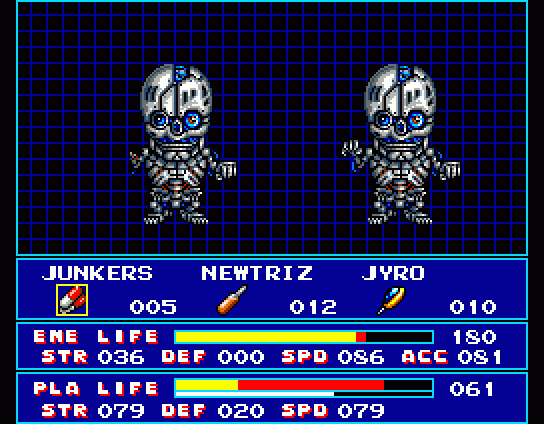Producer(s) Yutaka Haruki Initial release date 27 April 1990 Designer Hideo Kojima Genre Role-playing video game | Mode(s) Single-player Developer Konami Publisher Konami Platform MSX | |
 | ||
Programmer(s) Hideo Shiozaki
Toshiya Adachi
Hideo Shiozaki Artist(s) Tomiharu Kinoshita
Masashi Sakurai
Chisa Matsuda Writer(s) Yoshihiko Ota
Hideo Kojima Composer(s) Masahiro Ikariko
Mutsuhiko Izumi
Motoaki Furukawa
Michiru Yamane
Yuji Takenouchi
Harumi Ueko
Yuko Kurahashi
Tomoya Tomita
Tsuyoshi Sekito
Kazuhiko Uehara Similar Hideo Kojima games, Adventure games | ||
Sd snatcher the nightmare before christmas
SD Snatcher (Japanese: すーぱーでふぉるめ・スナッチャー, Hepburn: Supa Deforume Sunatchā, Super Deform Snatcher) is a role-playing video game by Konami for the MSX2 computer platform released in 1990 exclusively in Japan. It is a spin-off of the original Snatcher, adapting the same storyline into a different genre. In contrast to the original game's realistic art style, SD Snatcher features a "super deformed" art style, depicting all of the game's characters with big heads and childlike proportions (only the game's ending deviates from this style and reverts to the original game's realistic style). Like the MSX2 version of the original Snatcher, SD Snatcher was released with a proprietary cartridge that contains the Konami SCC custom sound chip, along with three floppy disks containing game data.
Contents

Gameplay

As with most RPGs released at the time, the game consists of overhead exploration of areas and menu-driven turn-based battles. However, it discards random encounters and introduces battle system, which uses a first-person perspective that allows the player to aim at specific body parts of an enemy and disable certain characteristics. For example, shooting a robot's wheels or legs will render the robot immobile, making it less likely to avoid the player's gunfire, attacking its weapon will reduce its strength, or continuously attacking its weak point could lead to a potentially quicker victory. As with other RPGs, the player can upgrade their weapon and purchase auxiliary items that can be used in battle to make battles easier. The game also introduces an auto-battle feature, where Metal Gear Petit can take control of the battle. Each of the firearm weapons have different abilities and target ranges as well as limited ammunition that needs to be brought or found separately. Such a battle system has rarely been used since, though similar battle systems based on targeting individual body parts can later be found in Interplay's Fallout (1997), Square's Vagrant Story (2000), Bethesda's Fallout 3 (2008) and Fallout: New Vegas (2010), and Nippon Ichi's Last Rebellion (2010).
Plot

SD Snatcher follows the same storyline as the original Snatcher. Like in the original game, story is set in the year 2042, where the player takes control of Gillian Seed, an agent of the JUNKER organization assigned to investigate a breed of cyborgs known as Snatchers, who prey on humans by killing them and taking their place in society. There are several story differences between SD Snatcher and the other versions of Snatcher due to the change in the game's genre. SD Snatcher is notable for featuring an alternate version of the originally planned ending that was cut from the PC88 and MSX2 versions of Snatcher before their release. This planned ending would later be included in the subsequent CD-ROM versions of the original Snatcher, beginning with the 1992 PC Engine remake.
Release

SD Snatcher was released exclusively in Japan in 1990. In the early 1990s, the game was translated into English by a Dutch group of fan translators called Oasis. Although the quality of this translation arguably was not so good, it enabled many people outside Japan to play this game as well. In 2011, a re-translation project was started known as Project Melancholia. The release of this new English translation was expected to be around early 2012. On 2 January 2014 the project was released. This translation is not distributed freely though - the group requires monetary compensation for their patch. A demo translation is available on the site for download for free.
Reception

Retro Gamer included SD Snatcher on their list of top ten MSX games, calling it "an emotive narrative around the limitations of the hardware" and "easily one of the most immersive adventure games on the system."

